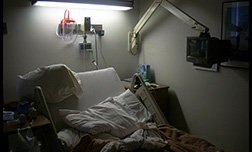Superbug Wars
New toolkit developed to help fight health care–associated infections

A team from Boston University School of Public Health (SPH) and Montefiore Medical Center has developed an extensive toolkit to help health care workers prevent and control a dangerous and highly contagious infection.
The Carbapenem-Resistant Enterobacteriaceae (CRE) Control and Prevention Toolkit was funded by the US Department of Health and Human Services’ Agency for Healthcare Research and Quality (AHRQ) and aims to provide national intervention guidelines for health care professionals, hospitals, and health departments.
The antibiotic-resistant “superbug” carbapenemase-producing Klebsiella pneumoniae (KPC) has been identified as the cause of many lethal infections associated with health care. In the first half of 2012, nearly 200 long-term acute care and short-stay hospitals in the United States had at least one CRE infection. Although these infections are rare, their rise is alarming because severe infections can kill up to half of the people afflicted, according to the Centers for Disease Control and Prevention (CDC).
Hospital administrators and other change agents “need both technical information and implementation advice to lead hospital staff in changing care processes to reduce the risk of health care–associated infections such as KPC,” says Victoria Parker, an associate professor of health policy and management at SPH. “These process changes, however small and incremental they may seem, can actually lead to better health outcomes—and possibly save lives. But these new practices have to be integrated into existing care routines in order to take root for the long term.”
Brian Currie, MD, MPH, vice president and medical director for research at Montefiore Medical Center, says, “The appearance of KPC in health care settings is a serious challenge to all medical professionals and it’s an area that requires significant attention to ensure patient safety. Our goal is to share our successful KPC interventions to help other institutions establish effective prevention programs.”
KPC first emerged in North Carolina in 1999. By 2013, it had been documented in 42 states and reached endemic levels in six states and around the world. KPC colonization is routinely found in patients in both acute- and long-term-care facilities and additional risk factors include recent treatment with broad-spectrum antibiotics and advanced age. According to a 2010 study, overall mortality for patients infected with KPC was 23 percent in seven days, 42 percent in 30 days and 60 percent for those hospitalized more than 30 days.
“This toolkit guides clinicians through the process of implementing an intervention, including readiness assessment, goal setting, implementation, and measurement,” says Currie, who is also a professor of clinical medicine in the departments of medicine (infectious diseases) and epidemiology and population health in Yeshiva University’s Albert Einstein College of Medicine. “At Montefiore, we detected KPC with a rapid molecular lab test, which resulted in immediate initiation of contact isolation for all positive patients. We virtually eliminated patient-to-patient transmission of KPC as a result of the implementation of the measures outlined in this toolkit.”
The AHRQ toolkit complements the CDC’s recommendations for preventing CRE in health care settings. It includes practical tools that are customizable to meet the needs of local hospitals. Key recommendations include enhancing screening to identify colonized patients, hand hygiene compliance, placing those testing positive on contact isolation precautions, minimizing use of invasive medical devices, and promoting antibiotic stewardship. SPH doctoral student Caroline Logan contributed to the report.
“It is extremely concerning that we’ve been seeing such a dramatic increase in the spread of KPC, the most common type of CRE in the US during the past 10 years,” says Currie. “It is more crucial than ever for health care professionals to take steps to control the prevalence of KPC in order to protect their patients and their communities.”